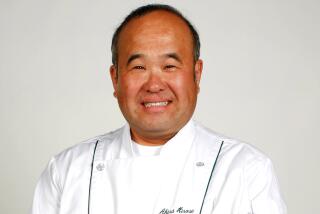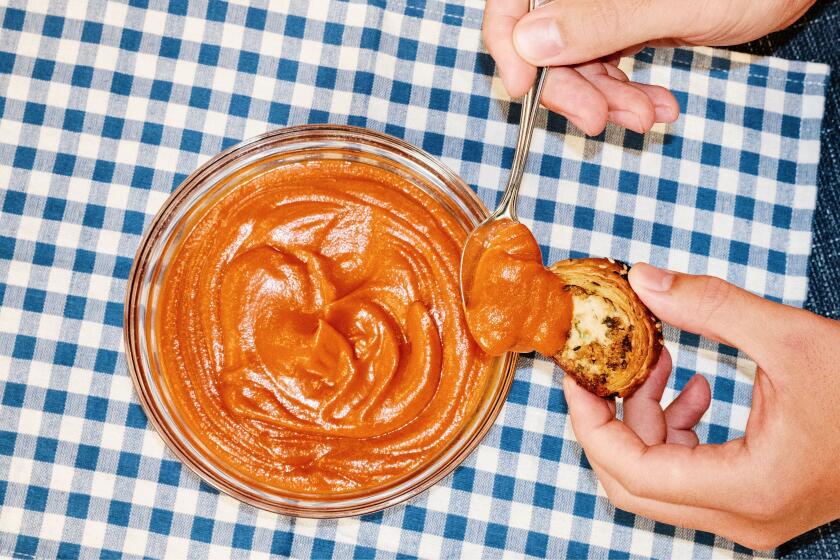The Great Gadsby
A hundred blocks south, far on the other side of the I-10, is a world that chef Robert Gadsby could easily not know, let alone care about.
This black Brit with a high-toned resume set in storybook locales (Thailand, France, Italy, Singapore) and blue-blooded gentleman’s bearing would seem to have little reason to move outside L.A.’s increasingly exalted culinary circles. What would he necessarily know of Watts--a piece of L.A. still crisscrossed by decrepit railroad tracks and still struggling as much with outside stereotypes as it does with its own sagging self-esteem?
This far north, at Wilshire at La Brea, a boulevard at its northern edges jammed with posh upholstery stores, flamboyant antique shops, amber-lit boutiques and an equally moody set of eateries, brothers Danny and Richard Franco and their friend William Henagan cut a little uncertainly down an alley and into the humid, rattling kitchen of Gadsby’s. It’s a bewildering other world.
Tying crisp, bleached aprons over their baggy jeans and dress-length shirts, they hide their hair with baseball caps or hurriedly band it into ponytails, ready to sample an exotic slice of life.
In the pause between lunch and dinner, the rest of the kitchen staff is already fast at work, chopping mushrooms, green onions and tomatoes--the steamy room filled with the music of work--water spilling into a stainless-steel sink, metal tapping wood, murmured conversation waltzing from English to Spanish to English again.
Like a character out of a Roald Dahl child’s fantasy, Gadsby, 39, descends from an attic loft, his black clogs hugging the rungs of the white ladder. He rushes into the kitchen, ties on his apron over black-and-white pinstriped cook pants and a red-and-black lumberjack vest.
“Did you wash your hands?” Gadsby asks with a sweeping glance over his oval frames and rubbing his palms together. Slowly, in a half slump, the trio shuffle off to the sink.
Once scrubbed, Gadsby lines them up in front of a cutting board while pulling down a chicken breast. He rains salt on top, then dispatches them to different preparation tasks. Danny, 19, mixes ground beef, green onion, tomatoes and mushrooms into a filling. Richard, 16, pounds on the chicken breast with a wooden rolling pin the size of a baseball bat. William, 17, cracks an egg over Danny’s mixture: “The egg,” Gadsby explains, “binds it together.”
For these young men, this uptown oasis is a grand departure from a mode of thinking that prunes away opportunity, hems them in. From tagging, drugs, gangs, scarce job options--these distractions, temptations and limitations can tug them off the path leading to a broader future. But once a week, for three hours in a kitchen, Gadsby hopes to pave a different way out, making what appears unreachable and unfamiliar, less so.
These students are selected from two youth programs of the Watts Labor Community Action Committee. This partnership serves as a bridge for at-risk kids with unarticulated artistic talents to find ways to not only channel their restlessness, but to tap their creative source.
Some weeks a procession of Locke High School and Jordan High School students learns to prepare exotic fare--stuffed breast of chicken roll with California wild lettuces, or white chocolate ginger ice cream. Other weeks it’s a foray up the street to the Cooks Library to learn the foundations of menu planning, or field trips to the grocery to learn the secrets of selecting top-quality produce--be it a piece of meat or a leaf of an herb.
“When I was growing up I was staying with my grandmother and she wanted me to learn how to cook. ‘You don’t need a woman unless you need a kid,’ she’d tell me,” says Henagan, boasting about his potent chili recipe and barbecue ribs. “I can put a woman to shame in the kitchen.”
“Some wives don’t like to cook, so that means we’ll be prepared for anything,” says Richard, chuckling; he already sees that some deft moves with pots, pans and condiments well might score points with the ladies.
But Danny waves them silent, then reflects for a moment. “I come for the learning part. You don’t often get a good opportunity, so when you do you can’t let it slip away.”
Nor can you let them wander too far out of an embrace. “Some of them have been picked up or have served time for tagging,” Gadsby says. “Others have trouble at home but no place to vent it. In the kitchen I try to show them connection between art and nutrition. About balance and restraint. How all those parts create a whole.”
*
This is only one small part of a larger business--and even broader community plan, Gadsby explains over a lunch of his own butternut squash soup and freshly baked bread.
Their partnership, called Watts and Gadsby’s, was conceived and tended by Gadsby and Teryl Watkins, president and development director of WLCAC, a community-based organization that since 1965 has worked to rejuvenate Watts / Willowbrook and surrounding South L.A.
The organization has long worked to improve the entire Watts community, through job training, senior programs, day care, community development and building. But creating and nurturing opportunities for youth--the future--has been a top priority.
The plan Watkins and Gadsby have conjured is three-tiered--starting with an ice cream and bread-making concern that could be a money-making community venture, this month adding a catering business to teach students the ropes of planning, preparation and presentation using various WLCAC functions as a proving ground. All this is in preparation for the finale: the South Los Angeles Bar and Grill, to be staffed by the youth of Watts and Willowbrook as part of WLCAC’s open-air market, planned for unveiling later this year.
“It’s a way of introducing a healthier type of food to that community,” Gadsby explains, “while relying on the youth of that community.”
This union was perfectly happenstance. “I walked into LunaPark one night for one of Robert’s tastings and oh!” shouts Watkins, palm raised and waving in the air, rocking in her seat. “I got the vapors! I got one of his stacked filet mignon with shoestring potatoes.” She started coming by weekly. Sometimes twice. Often with friends in tow, always with an appetite.
“I got real dramatic on him,” Watkins explains. “Talking to him some more I was really impressed. Here was a man with creative mission.” She was impressed with his resume.
The “peripatetic chef,” as some restaurant critics dubbed him, had touched down in a host of L.A.-area kitchens including Checkers, Xiomara, the World Cafe, the Olive and the Trocadero. So Watkins got to thinking, “I didn’t think that the restaurant appreciated him enough. I saw that Robert had no connection in the black world, but I saw the connection and the potential for that link. He wanted to open his own restaurant. I told him I’d invest in the restaurant if he’d invest in the community.”
Watkins kept her word and bought shares. Then raised her investment in the form of constant and unfailing moral support. Gadsby went to work. For the North London-born chef, it was a chance to prove to his parents (still harboring my-son-the-doctor dreams) that he was more than a “cooker.” Out of it bloomed an elegant room--part boi^e, part dream--all frosted glass and burnished edges. His logo: the Eiffel Tower rendered in Japanese pen stroke (France and Japan--the cuisines of influence); the tower’s tip, “a finger pointing to the sky.”
That detail, an encoded nod, is an important puzzle piece. The desire was not to fulfill something as ephemeral and gauzy as a dream but a point-by-point plan--that had more than menus, reviews and rankings in mind.
“I wanted to give honor to my brother,” explains Gadsby, who lost his twin, Wayne, nine years ago. “My brother was the chef in the family. I was the manager.” A freak accident stopped everything suddenly. “His fiancee shot him, thinking that he was a burglar. He died in my arms.”
For Gadsby, who had spent his pre- and post-college years in Europe trying on careers like flashy jackets (hairdresser, pot-washer, investment broker), that death provided razor-sharp focus. “My dreams became ambitions. You can keep dreams. I just wanted to work hard enough for it and then dedicate it to my brother.”
*
If Gadsby no longer had his own dreams, his ambitions have certainly allowed others to develop and cultivate theirs. And now his small kitchen is filled not only with kids just starting out but people making a second or third stab at life.
“I wrote him while I was in prison,” remembers Jeffrey Henderson, 32, who first heard of Gadsby through an article in USA Today about black chefs. “I hadn’t seen brothers doing it on this level--not selling soul food, fried chicken or ribs. That stuff is killing us. I told him a little bit about myself, I got a job working in the kitchen in prison and that’s when I found out I could do something more than dealing drugs.”
When Henderson was released he made his way to the restaurant.
“I came back a few times. He talked to me while he was rushing around and, eventually, when he believed that I was serious, he decided to give me a chance.”
Philip Shaw listens to Henderson’s story, perched on a high-backed sushi bar chair, nodding. Shaw too came to Gadsby, a clipping in hand, looking to change professions. A former accountant, at 45 he wasn’t sure what the chef might have to offer except a polite escort to the door. “He didn’t know me from Adam, but he did more than give me a job, he made me a believer in myself,” says a full-to-bursting Shaw, who in the matter of hours would be shipping off to new work, and a new life, as a chef in Antigua.
Gadsby shrugs off the compliments the way he has ill-fitting professions. He drowns them out with talk of purpose, of future; his words bubbling forth fast, like a pot at rapid boil.
“I’m just giving,” he says. “Cooking is the purest act of generosity and love. It’s not about money. These kids today don’t have ambitions. I’m trying to give them something to grasp.” A food of a different sort.
Something that will help Watkins fulfill her father’s dream, to see the day that, in more ways than one, Watts can feed itself.
More to Read
Eat your way across L.A.
Get our weekly Tasting Notes newsletter for reviews, news and more.
You may occasionally receive promotional content from the Los Angeles Times.










